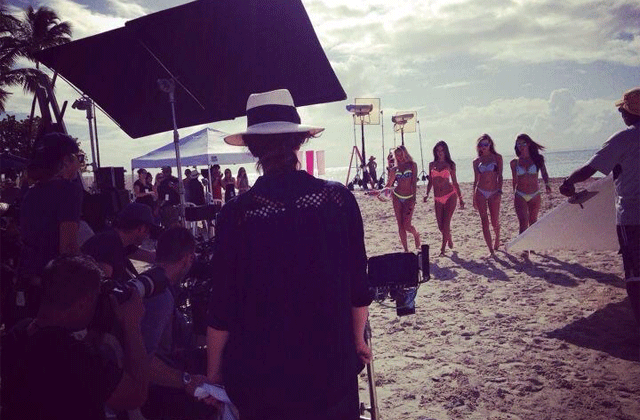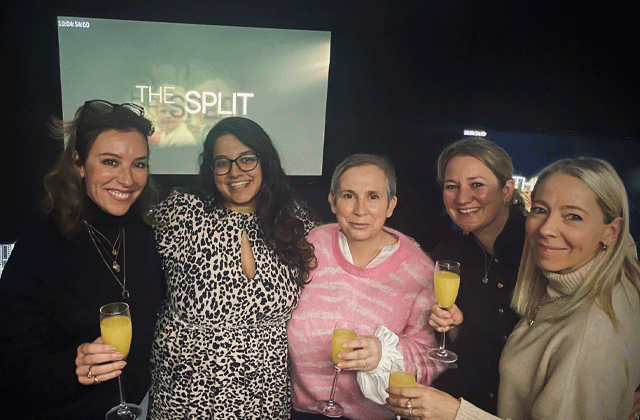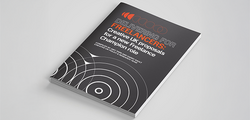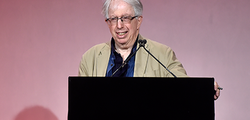Earlier this year, the BBC’s acclaimed drama The Split aired its final season – becoming one of the broadcaster’s most watched dramas of 2022.
But while the third series brought Abi Morgan’s acclaimed portrait of the Defoe family to an end, for Directors UK member Dee Koppang O’Leary it marked a new start in the world of fiction directing.
We spoke to Dee about how she managed the various transitions in her career to get to this point: from factual and entertainment directing to drama, and from 2nd unit to lead director. We also spoke to Dee about how she made The Split, and what it’s like to make your drama directing debut on one of the UK’s most talked-about shows.

Let’s start from the beginning – when did you know you wanted to be a director, and how did you get your first start in the TV industry?
When I was little, all I ever wanted was to be either an actress or a director. I grew up in Oslo watching a lot of old musicals with my Mum and Nanna. I had a very early obsession with the likes of Fred Astaire and Ginger Rodgers, Gene Kelly, Sonja Henie, and Deborah Rodgers. I always knew I wanted to work in either film, television, or theatre. I genuinely never wanted to do anything else.
I was constantly coming up with ideas and writing plays… and was probably a little bossy, and made everyone perform in them. I continued the obsession with drama at school, directing lots of plays. I studied Media Performance at Salford University Manchester, and then when I graduated, I started as a runner on a music chart show in London making teas and photocopying scripts. I fully immersed myself in the freelance world and hopped from show to show, trying out multiple production companies.
I was a runner, coordinator, researcher, AP, Shooting AP, DV Director, PD, series director etc. I spent the next 15 years working my way up in the exciting worlds of music shows, observational documentaries, live breakfast TV, and reality shows like Big Brother, Shipwrecked, etc. I then gravitated towards location filming, and because I speak several languages, I found myself working on a huge amount of extreme travel documentaries around the world. First as a self-shooting AP, then as a DV Director, and eventually PD and Series Directing. I spent a lot of time on desert islands in the South Pacific, filming whales in Tonga with Minnie Driver, climbing mountains with Ben Fogle in Africa, and camping in the Arctic with Ian Wright. It was quite the adventure.
After a few years, I moved across into huge ‘as live’ events, mainly music based, for production company Done + Dusted. Working for them between London, LA and NYC I directed VTS for several years on shows like The Victoria’s Secret Fashion Show (for CBS), The Olympics Opening Ceremony, British Fashion Awards and directed two one-hour documentaries on a world tour with Justin Bieber for NBC. It was an incredibly fun and exciting time, especially getting to work with some of the biggest artists on the planet, including Rihanna, Lady Gaga, One Direction, as well as some of the biggest supermodels of the moment.

How, practically, did you go about making that transition into drama? Were there people you spoke to for advice — did you seek out shadowing or other practical experiences?
I had always wanted to work in drama really, but I kind of fell into the non-scripted/ factual and entertainment world of television, which I really enjoyed. I knew that I would eventually transition into drama, I just wasn’t quite sure how to go about it.
It was a terrifying prospect, and it felt like such a giant step. It is notoriously tricky to switch between genres. I had been directing for a while on some very big budget shows, so I wasn’t afraid of the scale. But somehow, making that jump into scripted and collaborating with actors felt like such a big leap.
At the same time as working in television I had been developing a script called Gypsy Boy with Christine Langham (previously Head of BBC Films), based on the book by Mikey Walsh and adapted by James Graham. I was suddenly launched into the world of feature film development, and I started to realise that narrative/scripted was where I really wanted to be.

A very good television producer friend of mine, Melony Smith persuaded me to reconnect with an old television director friend, Ben Caron. He had made the switch a few years previously and was making incredible work, directing the TV series like Wallander and Sherlock. He very kindly invited me to shadow him on Sherlock. The moment I stepped onto that set I realised that this is where I was supposed to be. It sounds completely cheesy, but it is genuinely true. I have never felt more at home.
Off the back of that, Ben invited me to do some 2nd unit directing work for him on The Crown season 2. I was in complete heaven, and totally fell in love with it. It somehow felt like everything had aligned. A drama set is really a wonderful hot mess of all the things I love. Storytelling, actors, production design, music, choreography, fashion, hair & make up, and art. The perfect mix.
I went on to work on and off for Ben, and some of the other directors (Jessica Hobbs and Philippa Lowthorpe, Christian Schwochow) on seasons 2, 3 and 4. The Crown became my training ground really. Ben Caron and Leftbank were incredibly supportive of my learning. I feel incredibly lucky to have learnt from the best in the business, and I am forever grateful to Ben for giving me that opportunity.

So, your first drama directing roles were 2nd unit – how did you find that experience? Were there elements of your experience in factual and entertainment that you thought transferred well?
It can be a little scary at first, but all your skills from directing in other genres are all so relevant and useful. You end up bringing so much to the table because you have not necessarily come up through the ranks in the traditional way.
Having worked on some pretty big shows previously, I wasn’t scared of the scale, but it’s very different switching to working with a story and actors, rather than people being themselves. I decided to take a refresher and do an acting summer course at RADA to get myself back in the mind space of how actors feel on set.
Working as a 2nd unit drama director was the perfect place to learn, and you had a front row seat working with incredible directors as well as full access to all the incredible departments, producers, and script teams.
What advice would you give to other directors looking to move into drama from other genres?
Do it. Do not be scared to make the jump. If you are thinking about it, do not lose that want or curiosity. Just make the leap. Get on set and ask to shadow. There is no harm in that as people can only say no. You can always go back if it’s not for you.
Let’s move on to The Split. How did you first become attached to the programme? What sort of preparation did you do go into the hiring process – and what was it like?
I had a great ‘general’ zoom with Sister Pictures during lockdown, and very shortly off the back of that, the producers of The Split had gotten in touch with my agent at Casarotto, enquiring if I might be interested in their final season. I was a huge fan of the show, and of course utterly obsessed with Abi Morgan’s incredible scripts. There was also a lovely bit of serendipity as director Jessica Hobbs had set up and directed season one. At first, they offered me lead director – helming three episodes. Then they asked if I might consider directing more as Abi Morgan wanted to direct an episode too as it was the last season. In the end I ended up directing five out of the six episodes, sharing episode five with Abi.
Tell us about prep: how involved were with your creative decisions before shooting, such as casting, crewing up?
The Split has an extraordinarily strong all female team at its core. Executive producer and writer Abi Morgan, executive producer Jane Featherstone, executive producer Lucy Dyke, producer Emma Genders – all had worked on the previous series, and then first time Producer Sumrah Mohammed. Sister is an incredible production company to work with and this team of brilliant women were all wonderfully collaborative and came with a wealth of knowledge from the previous seasons.

As this was my first time as a lead director across a whole episode, let alone a whole series, Lucy Dyke and the team were incredibly supportive. Lucy even made sure that I started work on the series way earlier than normal. I sat in on the script development meetings, which was incredibly useful as it meant I felt fully immersed in the scripts and understood the reasoning behind each and every script decision. And of course, getting to work with the brilliant Abi Morgan every day — that was incredibly special.
When crewing up I brought in my own DOP, Mark Nutkins, whom I had also worked with on Bridgerton Season 1. We have known each other since we were 18 – and had studied drama together at university. We have an almost brother/sister relationship with each other – a great shorthand. We also brought in our favourite Gaffer, Colin Thwaites, and key grip and fellow Norwegian, Sue Ellen Meidell. The rest of the team we very much crewed up together. Mark does a lot of mentoring for people in the camera department, and we both like to have a 50/50 male and female camera team.
With casting, this was my first time going through the full process. I loved it, although sadly so much of it had to be conducted on zoom as we were still in semi-lockdown. We collaborated with the lovely Victor Jenkins and Seth Mason, who guided me through the process. Obviously, as a returning series, most of our cast were already in place, but we had a lot of fun finding our guest stars for each episode. The likes of Lindsay Duncan, Tom Rhys Harries, Jemima Rooper, and Lily Cole. As well as finding Karen Bryson and Clarence Smith for the parts of Lennie and Felix – and ace newbie Alex Guersman as Gael.
Of course, on The Split you were working with a hugely respected and acclaimed writer and exec in Abi Morgan. How much collaboration was there between you and Abi, and how did you make that relationship work?
Working with Abi was a total highlight. I adored her from the first moment we met. We went for a three-hour walk in Hampstead Heath during the midst of winter. It started to snow, and I remember leaving that meeting on a total high. I was so excited to dive into the show. We talked and talked, and I just felt like I was gossiping with a friend about the Defoe family. I wanted to know everything about these characters, where the final season was going – and to unpick and analyze all the twists and turns. Abi has such an incredible way of writing in a figure of 8. It is never the way you expect it go – and then suddenly all the curves magically align.
I was lucky enough to have Abi on constant speed dial. For example, I could check in with her throughout the shoot to double check intention, or to get a second opinion on plans for scenes. It was a true collaboration.

Let’s move on to the shoot. Amazingly, this is your debut as a drama director. Were there any nerves or concerns before the first day on set? Did you do anything to combat them?
Everyone always has an element of imposter syndrome. Also, when you step into a third season where everyone has worked together for five or six years, and it feels like a family already. That can be tricky to navigate. Luckily, the cast and team were so open and welcoming. It was a very collaborative team.
Stepping up from 2nd unit directing to main unit… it’s a very big step. I always say that when you are making a show it’s like renovating a house. With 2nd unit directing you oversee some of the smaller elements, like maybe the hallway loo, or the spare room, etc. Suddenly you are now in charge of the whole house. And the house next door. Maybe even the entire street. It is an enormous difference. And you have to be exceptional at juggling a million pieces at once.
You also definitely feel the pressure of the volume of pages you must get through in a day, particularly challenging when shooting during Covid. It complicates things and naturally adds a lot of pressure on to the schedule.
I was a little nervous about taking on such a loved show. It’s the second most watched show on BBC iPlayer (after Normal People) and airs in 128 countries, I think. So many people really love the Defoes passionately. I wanted to make sure this series felt like it fitted with the previous ones in style and tone. Also, as it was the last ever series, the ending was of course vital.
The Split has an incredible cast – did you tailor your approach to working with actors individually, or approach every actor in the same way?
I think you must tailor your approach to each actor. You have your set core values and style, but you must always adapt to the individual needs of each person. Everybody is different, and everyone has their own loves / hates, and different ways to make them feel comfortable and safe. The challenge is to figure out each person’s recipe to get the best out of them on set.

How did you get develop the look of the show – what decision did you make around cameras, lighting, grading, etc?
Our DoP Mark Nutkins and I analyzed seasons 1 and 2. We needed to set some rules and styles that would complement what had gone before, but we were also mindful that we needed to move the look on (as the first series was created 5 years ago), and of course we wanted to put our own stamp on the show.
One important thing was deciding on our movement. Season 1 had been filmed on a combination of stedi and handheld. Whereas season 2 was shot handheld. Mark brought to the table an amazing new system called the Helix. A cross between the two. A rig which gave us real freedom in movement around the set. The nature of the show is that there can be quite a few characters weaving in and out of the scene – especially in Hannah’s house and in NHD. We wanted to capture the chaos of family life as well as the slick movement and long walking shots in the office.
We were keen to use Alexa mini but with large format, as Mark had recently used this on a previous Netflix show.
The Split was shot at the height of COVID. That must have put huge pressure on production – what were the biggest obstacles, and how did you overcome them? What were the other major challenges of the shoot?
I think the hardest thing for any director working during Covid is communication. We rely on our full faces to react and communicate with our crew and actors. The moment you cover up half your face with a mask – that is then pretty tricky to express how you are feeling.
I am sure like most productions the schedule is always tricky. When you are in prep you can feel like you are preparing for battle. When you are shooting it can be an endurance test, but an utterly addictive one. Otherwise, we wouldn’t do it again, would we?
We also didn’t film the series in blocks. We shot all six episodes at the same time. All out of sequence. Shooting out locations. It was a real baptism of fire! However, although challenging at times I must stress I absolutely adored every moment and feel incredibly lucky and proud to have been a part of it.

What was your highlight from making The Split, and which scene are you most proud of?
There is a moment in episode 1 where Hannah is kicking the shed in the garden. I love her performance here so much. We shot that whole scene in one shot, but sadly due to time we had to cut into it in the edit. Another was with Fiona Button (who plays Rose) – her performance in the hospital at the end of episode one is extraordinary. I still cannot watch it without crying. Finally, the very last shot of the whole series is extremely special. I don’t want to say what it is, as it spoils the surprise, so you’ll have to watch it!
Tell us a little bit about post-production. How did you find that experience, and how many people had input on the edit?
I loved the edit. I had the most wonderful lead editor with me, Ollie Parker, and he cut episodes 1, 3, 4, 5 and 6. We worked incredibly closely for six months together in post-production. A wonderful and very collaborative experience, and we will most certainly be working together again!
I also absolutely adored the music process. I had a wonderful composer, Evan Jolly, and the most brilliant singer/songwriter, Olivia Broadfield.
We had viewings with Jane, Abi, and Lucy, who all had incredibly helpful and constructive input and had all been integral the previous seasons. As well as Producer Sumrah Mohammed who had joined for Season 3.
What lessons and experiences do you think you will take forward from making The Split to apply further on in your career?
You learn so much from every job you do. Every production throws up different situations and experiences, and you figure out how to manage each new situation. I learned a huge amount from Nicola Walker and all our wonderful cast on this one.

The Split is a phenomenon, everyone’s been talking about it and it’s a huge hit for the BBC. How does it feel to be a part of that? What have you made of the reaction?
It has been quite extraordinary. The response has been incredible. I, and all the cast and executives have been inundated with thousands of wonderful messages. I hear from fans daily. Lawyers, NHS workers, people going through divorce, people grieving, the list is endless. It is a testament to Abi Morgan’s incredible writing. She has created a world that is so relatable. People have fallen completely in love with the Defoe family. As have I. Defoe Sisters for life!
So, what is coming up next for you? Any exciting plans or projects on the horizon?
After 15 months working on the series, I am having a little break. I have a son who has just turned two years old, and we moved house mid-shoot (which I do not recommend) and so I am having a much-needed little bit of time off!
I am being sent some really interesting scripts though, so am just taking my time deciding on my next project. I’ll shoot some commercials in between my next big drama project – and I also have a feature film (Gypsy Boy) which I would very much like to get made at some point in the future…
Thanks so much for talking to us today!
Dee Koppang O’Leary is represented by Casarotto Ramsay & Associates. The Split is available to watch now on BBC iPlayer.






Have Your Say
Join the discussion on Facebook